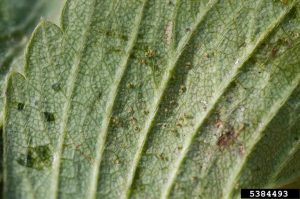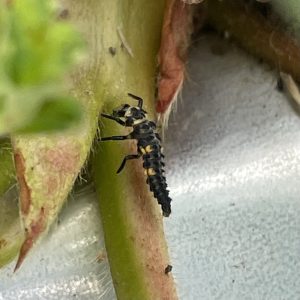Organic Day Neutral Strawberry Scouting Report for June 26, 2023
This scouting session for our day-neutral organic strawberry project at the West Madison Agricultural Research Station (WMARS) was conducted Monday, June 26th in the morning. Field conditions during collections were overcast, cool, very windy, and damp.
This project aims to evaluate the effects of four different film-based mulches (black, white, and reflective plastic mulches, and paper mulch) on strawberry production in an annual, day-neutral system. This system-wide field trial is evaluating yield, fruit quality, pest pressure, and economic feasibility of this regionally novel system for strawberry production. Our field was planted on the 8th of May, and plants are still developing with flowers and runners removed as they appear, with runner removal continuing indefinitely and flower removal continuing until the first week of July. We are irrigating for short intervals several times a week, with fertigation occurring once weekly at the rate of 5 lbs N per acre.
Sampling Methods: 160 plants (40 plants per mulch treatment) were randomly selected and assessed for insect pest and disease presence and respective pressure using the University of Wisconsin Extension BioIPM Strawberry Workbook. At each sampling point, two leaves per plant were tapped into a white tray, and any thrips or tarnished plant bugs were counted. Mites were assessed on an incidence-basis: plants were evaluated for mite presence on older foliage and crowns. Each plant was also inspected for foliar disease symptoms. Declining or dead plants are removed and assessed in the laboratory for biotic causal agents.

The incidence of two-spotted spider mites increased this week from 21% last week to just over 50% of sampled plants this week. Mites were again found only on the lower, oldest one or two leaves of affected plants, which appeared discolored and curled (Fig 1). Newer and outer leaves were once again untouched, and whole plants did not seem to show signs of decline due to these infestations at this time. For more information on mite management, please refer to this article.
Thrip presence decreased slightly this week, potentially due to the cool and very windy conditions. In contrast, Tarnished plant bug presence increased sharply this week, despite the lack of flower clusters. This coincides with the second harvest of alfalfa hay at the research station. In the next week or two, we will halt flower removals and begin tapping flower clusters to sample for thrips and tarnished plant bugs.
Table 1. The incidence and average number of insects and diseases observed per plant in day-neutral strawberries during weekly sampling.
| Date | Mites (Incidence) | Thrips (Average per leaflet) | Tarnished Plant Bug (Average per leaflet) | Spotted- wing Drosophila (Incidence) |
| 6/9/2023 | 0.21 ± 0.064 | 0.07 ± 0.07 | 0.03 ± 0.03 | 0 |
| 6/15/2023 | 0.21 ± 0.064 | 0.13 ± 0.1 | 0.01 ± 0.01 | 0 |
| 6/26/2023 | 0.51 ± 0.08 | 0.09 ± 0.07 | 0.20 ± 0.07 | 0 |
Since our last report, no new plants have shown signs of collapse. Samples from affected plant crowns are currently being processed, though they do not show characteristic signs of more notable fungal crown or root pathogens. Given the current significantly dry conditions, the progression of these pathogens is unlikely, though we will continue to monitor the field for decline.
During field walk-throughs, we have begun to see the early signs of Common leaf spot (Mycosphaerella fragariae) and Phomopsis leaf blight (Phomopsis obscurans) as a few isolated foliar lesions. These lesions did not yet appear in sampled plants during scouting.
Table 2. The incidence of diseases observed per plant in day-neutral strawberries during weekly sampling.
| Date | Common Leaf Spot | Phomopsis Leaf Blight | Verticillium Wilt | Anthracnose | Leaf Scorch | Neopest- alotiopsis |
| 6/9/2023 | 0 | 0 | 0 | 0 | 0 | 0 |
| 6/15/2023 | 0 | 0 | 0 | 0 | 0 | 0 |
| 6/26/2023 | 0 | 0 | 0 | 0 | 0 | 0 |
Misc Updates:

Multiple species of ladybug were present in our field this week – we found egg clusters, larvae (Fig 2), and adult beetles! These beneficial insects eat soft-bodied insects like aphids and mites, and are a welcome addition to our field.
Funding for this project was provided by USDA-NIFA ORG award # 2021-51106-35490.
This article was posted in Berries and tagged Ariana Abbrescia, Christelle Guédot, day-neutral strawberry, DNS, DNS Organic, Jarret Miles-Kroening, Leslie Holland, organic, Organic Day-Neutral Strawberry Production, Organic production, organic strawberries, Strawberries.
